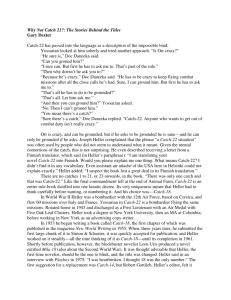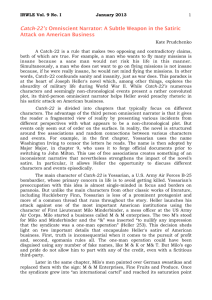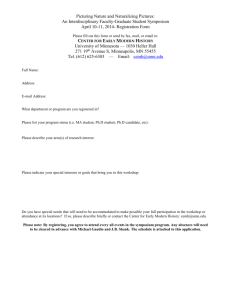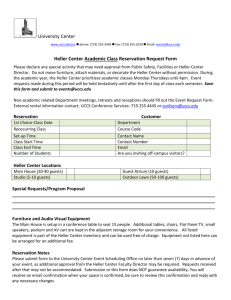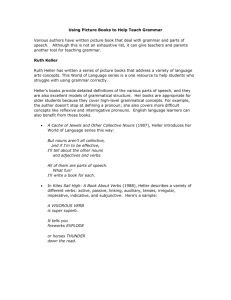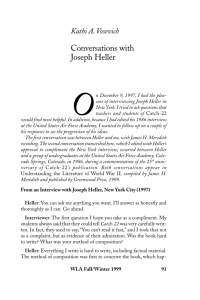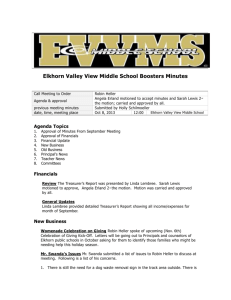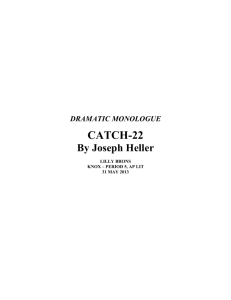Catch 22 as Satire
advertisement
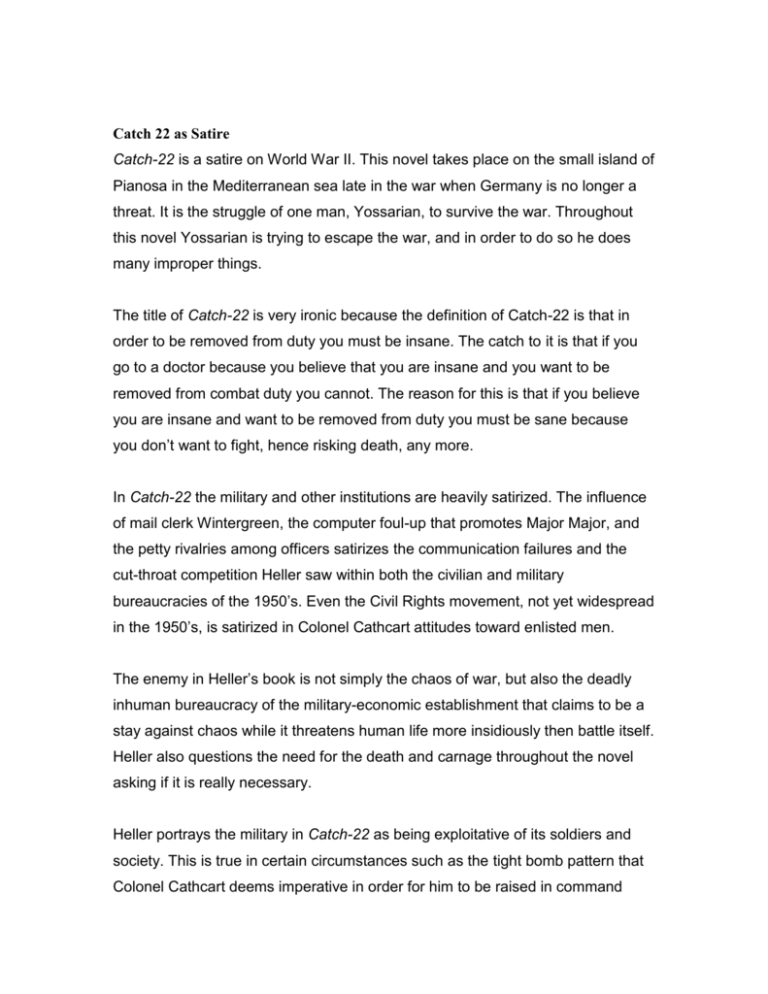
Catch 22 as Satire Catch-22 is a satire on World War II. This novel takes place on the small island of Pianosa in the Mediterranean sea late in the war when Germany is no longer a threat. It is the struggle of one man, Yossarian, to survive the war. Throughout this novel Yossarian is trying to escape the war, and in order to do so he does many improper things. The title of Catch-22 is very ironic because the definition of Catch-22 is that in order to be removed from duty you must be insane. The catch to it is that if you go to a doctor because you believe that you are insane and you want to be removed from combat duty you cannot. The reason for this is that if you believe you are insane and want to be removed from duty you must be sane because you don’t want to fight, hence risking death, any more. In Catch-22 the military and other institutions are heavily satirized. The influence of mail clerk Wintergreen, the computer foul-up that promotes Major Major, and the petty rivalries among officers satirizes the communication failures and the cut-throat competition Heller saw within both the civilian and military bureaucracies of the 1950’s. Even the Civil Rights movement, not yet widespread in the 1950’s, is satirized in Colonel Cathcart attitudes toward enlisted men. The enemy in Heller’s book is not simply the chaos of war, but also the deadly inhuman bureaucracy of the military-economic establishment that claims to be a stay against chaos while it threatens human life more insidiously then battle itself. Heller also questions the need for the death and carnage throughout the novel asking if it is really necessary. Heller portrays the military in Catch-22 as being exploitative of its soldiers and society. This is true in certain circumstances such as the tight bomb pattern that Colonel Cathcart deems imperative in order for him to be raised in command level. The military seems to act irresponsibly almost all the time. At one point in the novel the military ordered a whole civilian town destroyed in order to obtain a picture of a tight bomb pattern. It is also obvious in the novel that the military decisions are made in an absurd way and are highly illogical. The prime example of this is in the character Wintergreen who intercepts mail between the generals and doctors thereby allowing him to change orders to his liking. In Catch-22 Heller also portrays characters that hold high level positions in the military as being incompetent and irresponsible. An example is the numerous doctors that Yossarian fooled by faking a liver condition. Another is the characters of Gus and Wes, Doctor Daneeka’s assistants, who are shown as being incompetent for their rushing of people to the hospital for a fever and their painting to ill people’s’ toes and gums violet. In Catch-22 "Heller treats the senior officers in his book with criticism and scorn. General Dreedle’s want to shoot Danby for moaning is an excellent example of his portrayal of senior officers as incompetent, ridiculous characters" The pinnacle of Heller’s irony and therefore satire is in the characters and situations surrounding the characters of Dr. Daneeka and Mudd. The satire in both these incidents is directed toward record keeping. In Dr. Daneeka’s case he is believed dead because the plane he was supposed to be on crashed, yet he is really alive. The opposite is true in the Mudd situation. In this situation Mudd is killed before he signs onto the combat roster, so therefore he is treated as being alive while really dead as being alive. This treatment is such as his bags will not be removed from his former tent, and also all of the enlisted men speak of him throughout the book. Many other institutions are also satirized in Catch-22. Medicine is one of the institutions that is heavily satirized. He does this by portraying medicine as a science that is almost barbaric and not exact. He writes of how the men of the squadron used the hospital as a way out of battle. Catch-22 it self begins in the hospital where Yossarian is faking jaundice of the liver in order to avoid battle. Many characters also take this up as a form of staying out of battle. Heller addresses the barbarism of medicine with Dr. Daneeka’s aides. He writes of them painting peoples gums and feet violet in order to ward of certain illnesses. In Catch-22 Heller also satirizes religion. This occurs in Chapter Nineteen when Colonel Cathcart is aspiring to become a general. In this chapter religion is satirized in a number of ways. The first is when Colonel Cathcart uses it for a social icon to improve his chance of becoming general. Catch-22 also satirizes industry and finance. The reason this is true is because of certain things Milo says such as "What’s good for the syndicate is good for the country" Heller even takes his humor as far as naming his characters comically. An example is the comical naming of Major Major which turns into Major Major Major Major with his accidental promotion (11). The attaching of the prefix "Hungry" to Joe’s name in the novel is also comical, but Heller does not stop at that he goes as far as naming a character Scheisskopf, the parade crazed lieutenant, which actually means "shithead." Not only does Heller name characters comically he makes them act comically. The Loyalty Oath Crusade is an excellent example of this. This crusade is so completely absurd that it is humorous. Another example of the humor in this novel is the parades that Scheisskopf orders. It is not that he orders these parades that is comical it is his how serious he takes them. He comments to himself throughout the novel on how he will improve his parades. These ideas include nailing his marchers arms in the proper place. Perhaps one of the best examples of a comical character and who acts satirically is Milo Minderbinder. Milo runs a black-market syndicate in which he claims everyone gets the profits. Milo’s company acts as everything from a food supplier to a mercenary. The Germans hire Milo to do a number of missions. The one that Heller writes about in particular detail is the mission where Milo bombs his own squadron killing countless lives. Heller writes that Milo claimed responsibility for the act. As one would expect Milo would be arrested, but Heller carries the satire further by having Milo go free after he says "it made a huge net profit" Another of Heller’s comical characters is the character of Peckem. In the novel Peckem along with Colonel Korn plot to take over General Dreedle’s command. They do this by placing priority on such things as a perfect bomb pattern that endangers many men’s life’s. Heller’s description of Peckem is in itself comical he describes him as having the "ability to get men to agree" Still one further element of Heller’s humor is his comical language. The dialogue is extremely comical at times. An example of this is the hearing where Clevinger is being tried. Throughout this entire scene the characters often retort with just one word and even contradict something they said a moment ago. Throughout Catch-22 Heller discusses the theme of reality and appearance. He also discusses the difference between what is said and what is real. This leads to Heller’s irony. The best example of this theme of reality is when Colonel Catchart is discussing whether to punish Yossarian or give him a medal.

